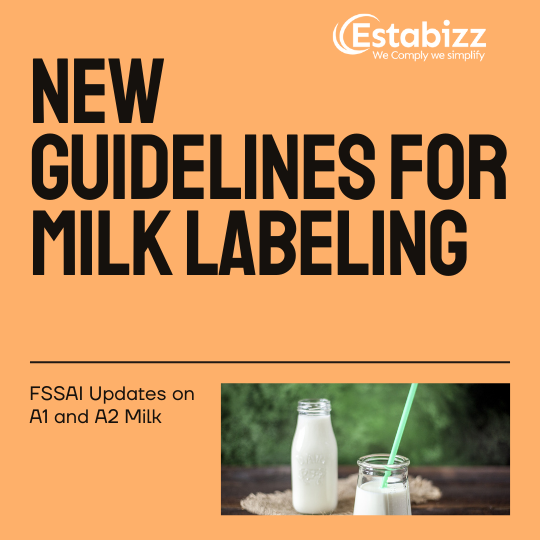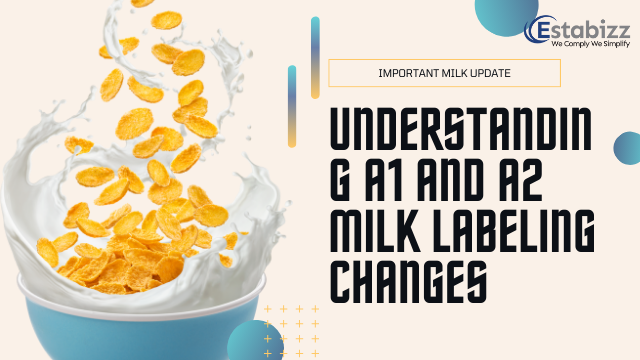FSSAI Revises Advisory on A1 and A2 Milk Labeling
In a significant update, the Food Safety and Standards Authority of India (FSSAI) has decided to retract its prior advisory, which mandated the removal of ‘A1’ and ‘A2’ labels from milk and milk products. This recent development, announced on Monday, allows food business operators (FBOs) to continue promoting their products with these milk type claims, pending further stakeholder consultations.

Initial Directive and Reversal
Initially, on August 21, 2024, FSSAI had enforced an advisory directing FBOs to eliminate ‘A1’ and ‘A2’ claims from their product packaging. This directive also extended to e-commerce platforms, which were required to comply by removing these claims from their websites immediately. The FSSAI’s concerns were rooted in the adherence to the Food Safety and Standards Act, 2006, stating that current regulations do not recognize the differentiation between A1 and A2 milk.
A1 and A2 proteins differ in their beta-casein composition—a variation influenced by the breed of the cow. Despite these differences, the initial FSSAI advisory imposed a strict timeline for FBOs to phase out existing pre-printed labels, specifying a non-extendable six-month period for compliance.

Rethinking the Strategy
However, the abrupt withdrawal of this advisory reflects a shift in FSSAI’s approach, opting for a more inclusive discussion with relevant stakeholders. This decision underscores the authority’s commitment to reconsidering regulatory practices concerning milk product labeling, potentially paving the way for new standards that acknowledge beta-casein differences.
Implications for Consumers and Industry
This policy pause by the FSSAI is crucial as it impacts how consumers identify and select milk products based on protein type preferences. It allows FBOs to maintain their marketing strategies around A1 and A2 milks, which play a significant role in consumer choice, particularly among those sensitive to different protein compositions.
As of the current update, there are no additional details pending regarding the FSSAI’s retraction of its advisory on A1 and A2 milk labeling. However, it’s imperative to highlight the importance of the ongoing consultations and what they signify for the future of milk product regulations in India.
Future Considerations and Stakeholder Engagement
The open-ended nature of FSSAI’s withdrawal indicates a period of uncertainty but also an opportunity for constructive dialogue. The key aspects to consider include:
- Scientific Research and Evidence: Further studies and evidence could be sought to ascertain the impact of A1 and A2 beta-casein on health. This could potentially influence future regulations and consumer information standards.
- Regulatory Updates: FSSAI may consider updating its regulations to accommodate the distinctions between A1 and A2 milk, based on global standards and scientific evidence. This would necessitate comprehensive discussions and alignment with international food safety practices.
- Consumer Awareness and Education: The ongoing consultations offer a chance to enhance consumer awareness about the differences between A1 and A2 milk proteins and their potential health implications. Clear, scientifically backed information can aid in making informed choices.
A Call to Action for Stakeholders
The Food Safety and Standards Authority of India (FSSAI) recognizes the importance of collaboration and is likely to seek varied perspectives from dairy farmers, food manufacturers, nutritionists, and consumers. Each stakeholder group has a unique insight that can contribute to a well-rounded understanding of the A1 and A2 milk debate.
Conclusion
In retracting its advisory on A1 and A2 milk labeling, FSSAI has paved the way for a more inclusive and evidence-based approach to food safety and standards. The authority’s willingness to re-evaluate and engage with stakeholders underscores a commitment to public health and the interests of the food industry. As consultations progress, the potential for updated regulatory frameworks looms on the horizon, promising clearer guidelines and informed choices for consumers across India.
The FSSAI’s decision to withdraw the August 21, 2024, advisory for further consultations highlights the dynamic nature of food safety regulations and their alignment with scientific findings and consumer rights. The Food Safety and Standards Authority of India is taking significant steps to engage various stakeholders in the dialogue on A1 and A2 milk labeling, ensuring that future regulations are well-informed and beneficial for both consumers and the industry. As these discussions continue, stakeholders are encouraged to participate actively in shaping a balanced and scientifically backed regulatory framework for milk product labeling in India.
Estabizz Fintech compiled the material in this article using the most recent Acts, Rules, Circulars, Notifications, Provisions, Press Releases, and material applicable at the time. They ensured the completeness and correctness of the material through due diligence. When using this material, users must consult the relevant, applicable legislation. The given data may change without prior notice and does not constitute professional advice. Estabizz Fintech disclaims all liability for any results from the use of this material.





